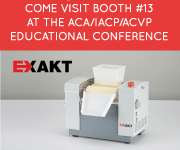|
|
|
 |
| |
 Letter from the Editor Letter from the Editor |
|
Editorial: Definitions of Compounding
This is the ninth in our series presenting various aspects of the new H.R. 3204 law (also known as the Drug Quality and Security Act [DQSA]) as it relates to pharmacy compounding. This week, we will look at the definition of "compounding" contained in the act (503b and 503a) and present it with the definition from the USP, as both have legal standing. Due to some differences in the definitions, pharmacists need to know which one is "binding" because there are some conflicts and differences. Also, the Act states that pharmacists are to follow the USP chapters on compounding, but the definitions of compounding are different between the Act and the USP.
H.R. 3204 Definition: Section 503b
"The term 'compounding' includes the combining, admixing, mixing, diluting, pooling, reconstituting, or otherwise altering of a drug or bulk drug substance to create a drug".
Section 503a (revised) Definition
As used in this section, the term 'compounding' does not include mixing, reconstituting, or other such acts that are performed in accordance with directions contained in approved labeling provided by the product's manufacturer and other manufacturer directions consistent with that labeling.
U.S.P. Definition:
The preparation, mixing, assembling, altering, packaging, and labeling of a drug, drug-delivery device, or device in accordance with a licensed practitioner's prescription, medication order, or initiative based on the practitioner/patient/pharmacist/compounder relationship in the course of professional practice. Compounding includes the following:
- Preparation of drug dosage forms for both human and animal patients
- Preparation of drugs or devices in anticipation of prescription drug orders based on routine, regularly observed prescribing patterns
- Reconstitution or manipulation of commercial products that may require the addition of one or more ingredients
- Preparation of drugs or devices for the purposes of, or as an incident to, research (clinical or academic), teaching, or chemical analysis
- Preparation of drugs and devices for prescriber's office use where permitted by federal and state law.
Loyd V. Allen, Jr., PhD, RPh
Editor-in-Chief
International Journal of Pharmaceutical Compounding
Remington: The Science and Practice of Pharmacy Twenty-second edition
|
| |
| News |
|
0.9% Sodium Chloride Injection Shortage Continues
The shortage of sodium chloride injection continues with hospitals and dialysis centers scrambling to manage their supplies. Healthcare providers are using smaller IV bags and alternatives, if possible, to cope with the shortage.
Frustration has resulted in one hospital asking the government to release saline from its emergency stockpiles. The FDA continues to say it is working with the three manufacturers of intravenous saline solutions to address the shortage as well as looking into alternative sources, including overseas suppliers.
http://www.washingtonpost.com/national/health-science/shortage-of-saline-causing-hospitals-dialsysis-centers-to-scramble-to-manage-supply/2014/01/28/9cfe2b8c-8862-11e3-833c-33098f9e5267_story.html?wprss=rss_national
PHARMA Layoffs and Closures
Layoffs are always big news and they get plenty of attention; they are an indicator of the health of the industry. The factors that eventually lead to layoffs are not simple. The patent cliff is often the big culprit; some companies try to get ahead of the curve with cuts. Generic competition isn't always the impetus for cuts. Another factor is demonstrated when Boehringer Ingelhiem laid off about 1,100 employees last year after the cost of bringing its Bedford, Ohio sterile manufacturing plant up to standards made it more cost-effective to just close the facility.
http://www.fiercepharma.com/special-reports/top-10-largest-pharma-layoffs-2013?utm_medium=nl&utm_source=internal
Increasing Drug Costs Cause Independents to Struggle
At Uptown Pharmacy in Westerville, Ohio, the list of generic medications available for $4 a month keeps getting shorter because the wholesale cost of generics continues to go up with increasing frequency. An example is a bottle of Divalproex that was purchased in October for $132 now costs $1,299. As the acquisition costs for pharmacies skyrocket, their reimbursement rates from pharmacy benefit managers (PBMs) like Express Scripts and CVS Caremark, lag behind by weeks—sometimes months—resulting in pharmacists filling prescriptions at a loss.
http://www.nbc4i.com/story/24559114/independent-pharmacies-struggling-with-increasing-generic-drug-costs
$84,000 Drug Price Tag Sets Off Payer Revolt
Payers face billions of dollars in new drug costs as pharmaceutical companies develop increasingly complex products. Third-party payers (Express Scripts, Catamaran, CVS, Aetna, etc.) are pushing back against the high cost of Gilead's drug. Alternatives include using similar drugs, refusing coverage for some, or subjecting treatments to more review by outside experts and refusing to pay a premium based on one drug being more convenient to take than another. Prescription drug prices make up more and more of the U.S. healthcare spending dollar.
http://www.bloomberg.com/news/2014-01-27/at-84-000-gilead-hepatitis-c-drug-sets-off-payer-revolt.html
|
| |
| IJPC Now on Facebook |
|
Become a fan of the IJPC Facebook page and share ideas, photos, and keep up to date with the latest compounding information -
http://www.facebook.com/IJPCompounding
|
| |
| Did You Know ... |
|
�that many (most?) compounding pharmacists have not read and studied the new compounding law (Sections 503a and 503b)? This does seem amazing, as it directly impacts our practice.
|
| |
| Tip of the Week |
|
Take time to keep up with your profession. Six years of college education is only preparation for "entering" the profession; not for "keeping up and staying" in it.
|
| |
| Looking Back |
|
Thirty days
Hath September,
April June and the
Speed offender!
Burma Shave
|
| |
| Accreditations |
|
PCAB is proud to announce the accreditation of the following pharmacies:
Flourish Integrative Pharmacy, Oklahoma City, Oklahoma; Jerrod Roberts, RPh, jroberts@FlourishRx.com. Re-accreditation for Nonsterile Compounding
Clark Professional Pharmacy, Ann Arbor, Michigan; Patrice Shook, CPhT, patriceshook@gmail.com. Re-accreditation for Sterile and Nonsterile Compounding
Precision Compounding Pharmacy, New Albany, Indiana; Laura Pfaffenberger, PharmD, laurap@pcpnewalbany.com. Re-accreditation for Sterile and Nonsterile Compounding
Infinity Compounding Solutions, LLC, Bentonville, Arkansas; Eric Wright, PharmD, ericw@infinitycompoundingsolutions.com. Initial Accreditation for Nonsterile Compounding
ABC Plus (America's Best Care Plus, Inc.), Fort Payne, Alabama; Jim Farmer, Executive Vice President, pharmacy@abcplus.net. Initial Accreditation for Nonsterile Compounding
Custom Compounding Centers of America, Johnson City, Tennessee; Dana Nidiffer, PharmD, Dana@cccarx.com. Re-accreditation for Nonsterile Compounding
BioMed Specialty Pharmacy, West Chester, Ohio; Eyad Alsabbagh, PharmD, eyad@biomedpharmacy.com. Initial Accreditation in Nonsterile Compounding
Hoye's Pharmacy, Tampa, Florida; Robert Hoye, President, bob@hoyespharmacy.com. Re-accreditation for Sterile and Nonsterile Compounding
Hagyard Pharmacy, LLC, Lexington, Kentucky; Scarlet Thomas, RPh, sthomas@hagyard.com. Re-accreditation for Sterile and Nonsterile Compounding
Pharmacy Services Inc. (d/b/a Bellevue Pharmacy), Maryland Heights, Missouri; John Hamilton, RPh, johnh@bellevuerx.com. Re-accreditation for Nonsterile Compounding
|
|





